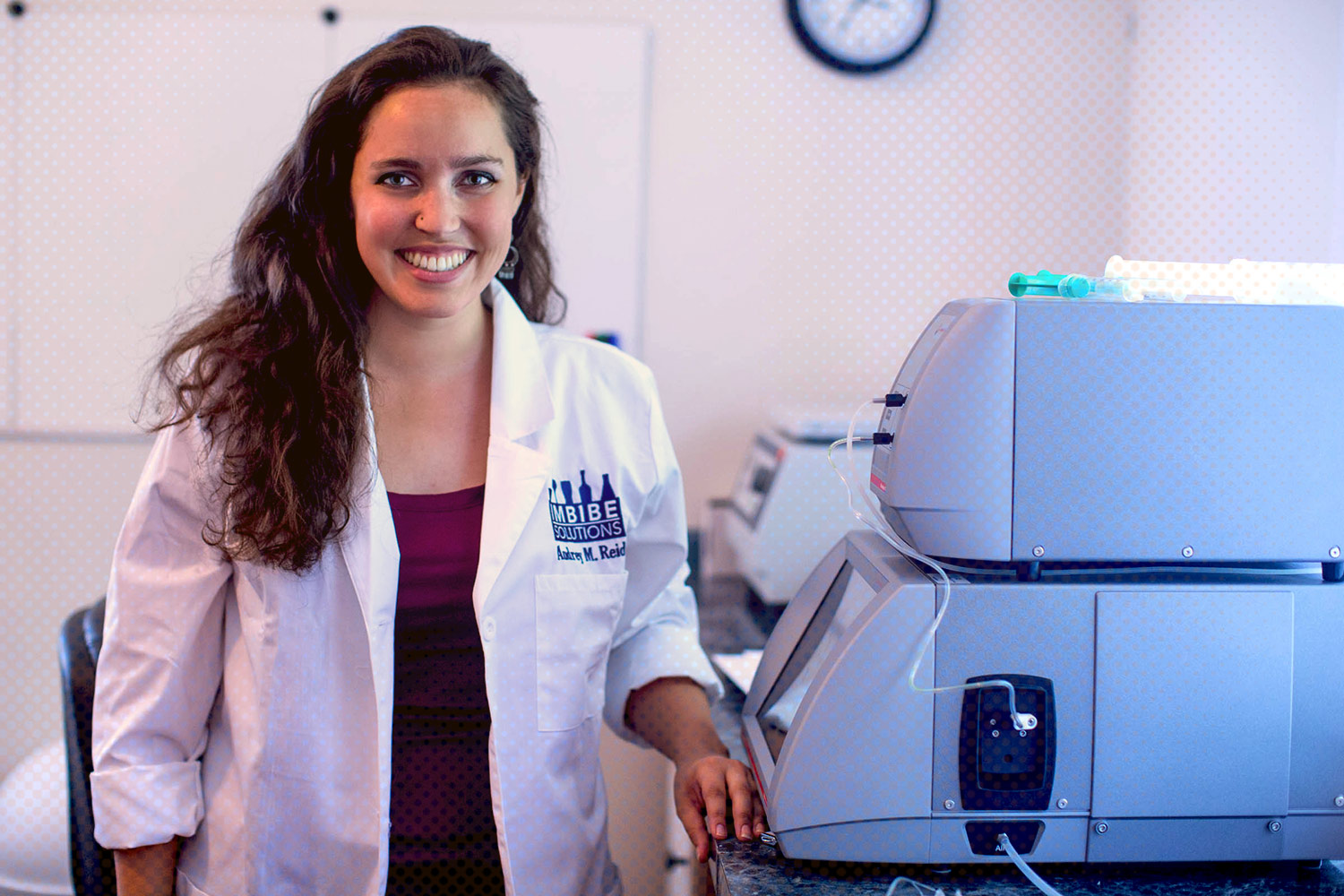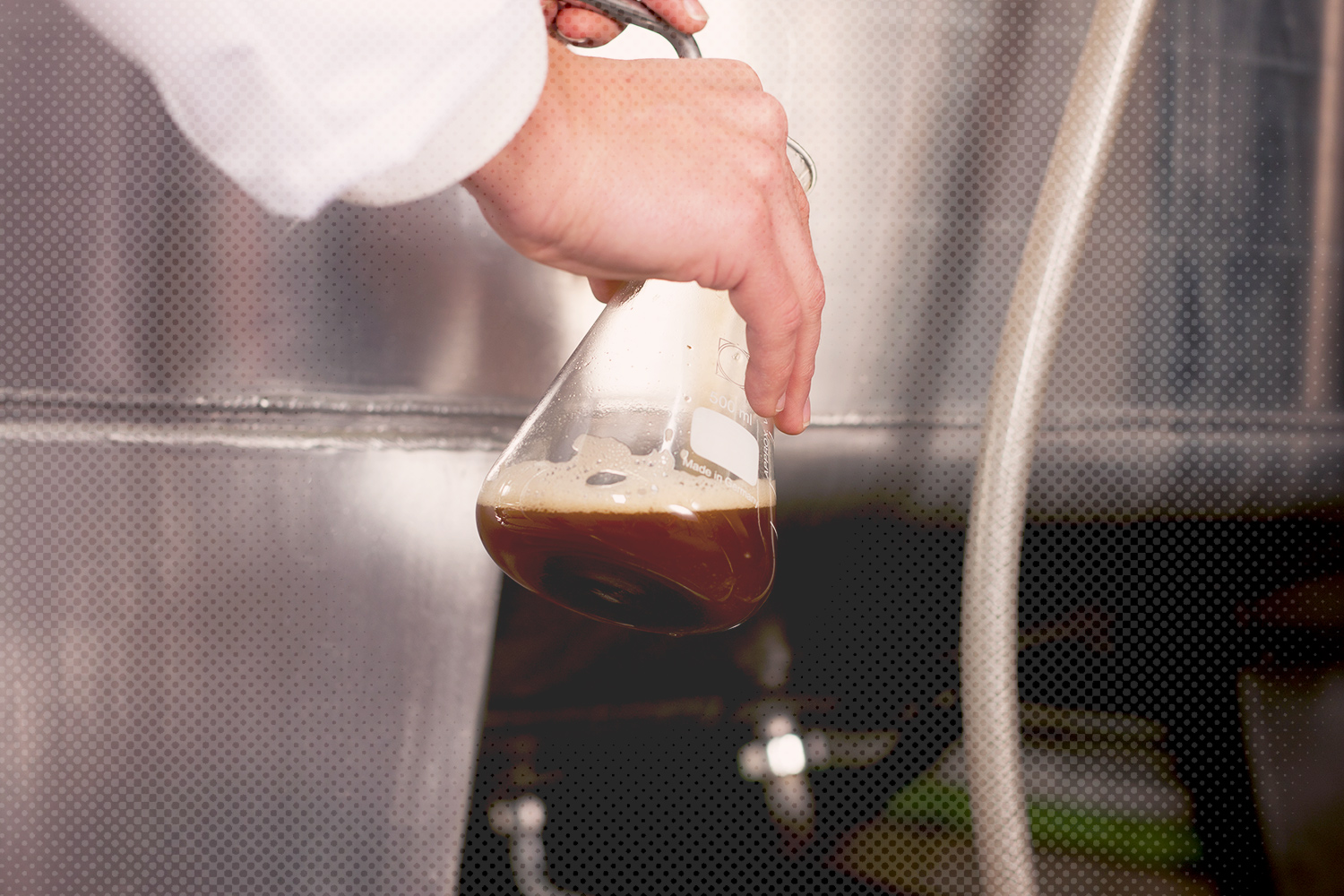Positioned squarely along both the Monticello Wine Trail and Virginia’s Brew Ridge Trail, Charlottesville has become a favorite destination for beer and wine lovers alike. New barrelhouses and tasting rooms are popping up all the time.
But until now it was difficult for local companies to access some essential support services that brewers and winemakers need. A new company out of the University of Virginia’s i.Lab Incubator is filling that gap.
“When I first moved to Charlottesville, there were no local labs offering testing services for beer, wine or spirits. A lot of people don’t realize it, but there is a real need for science in brewing,” said Audrey Reid, a chemist and founder of Imbibe Solutions, a lab that offers analytical services to local beverage companies.
Producers of alcoholic beverages are required by law to verify the alcohol content of their products, and crafters also need to run a wider range of regular chemical analyses on their products to ensure consistent flavoring and shelf life. Before Reid founded Imbibe, most local businesses had to send their products away for testing or invest in costly on-site equipment and training.

UVA’s i.Lab incubator has given a boost to Audrey Reid, who in turn is supporting the area’s surging adult beverage-making industry. (Photo by Sanjay Suchak)
“This service just wasn’t available,” said Levi Duncan, director of brewing operations at Charlottesville’s Champion Brewing Company. “We would send out samples for alcohol by volume content and things like that where we need approval from the [Alcohol and Tobacco Tax and Trade Bureau], but we had to send them off to Kentucky. That’s the nearest place we could get a reasonable response time.”
Duncan added that Champion has its own lab on the premises, but working with Reid has allowed them to expand their capabilities.
“People seem to be pretty excited about having a local laboratory, because it means faster turn-around times,” Reid said. “It also means that they can get data that they couldn’t get from other third-party labs because I can go there on-site. For example, if there’s a microbial outbreak in the yeast, I can help them diagnose it faster than if they had to swab everything and send it off to an out-of-town lab.”
Reid first became interested in the food and beverage industry while she was earning her bachelor’s degree in chemistry at St. Mary’s College of California. Wanting to meld her epicurean interests with her chemical training, she went on to earn a master’s in gastronomy from Boston University.
“During graduate school, I made a lot of friends who were into home brewing and I even had a friend that worked at a distillery. That got me interested in turning my degree in that direction, but I didn’t realize that the whole chemistry part of it was such a huge need,” she said.
When Reid moved to Charlottesville last year, she began working part-time at several breweries and a vineyard to get a better understanding of their day-to-day needs. As the idea formed for Imbibe Solutions, Reid enrolled in Charlottesville’s Community Investment Collaborative. Through that 17-week entrepreneurship program, she was introduced to UVA’s i.Lab and successfully applied to join its summer cohort.
“The resources at the i.Lab are amazing. I have these fantastic entrepreneur mentors who are helping me figure out so much about running my business,” she said.
Through the i.Lab, she has access to in-person mentors who offer lessons on the early stages of launching a business, and to a network of experienced entrepreneurs living around the country who can provide advice and counsel through the new Virtual i.Lab.
“Audrey is a dedicated entrepreneur, receptive to following the design thinking process and following opportunities wherever they lead her,” said Jason Brewster, director of the i.Lab Incubator and one of Reid’s mentors. “Imbibe is improving the quality of wine and beer by bringing the technology of large brewers and wineries to the boutique establishments in the commonwealth of Virginia.”
With the i.Lab’s resources at her disposal, Reid has set up a permanent lab and is building a client list of local vineyards, breweries and distilleries. She’s also setting up schedules of on-site testing for things like carbon dioxide and dissolved oxygen levels. Those levels have to be taken right off the canning line to get the most accurate reading and both are important for assessing shelf life.
“I offer on-site testing for that and for things like sugars or water quality, which strongly affect flavor,” Reid said. “I’m also doing some microbiology. I will be testing and looking at yeast, making sure that the breweries and wineries have the pure sample they need without any wild yeast or bacteria that could spoil the final product.”
For new, smaller businesses, Reid is planning consulting services on the types of tests that would most benefit them. “That way they start to learn about collecting data and they see how useful it is for consistency,” she said. “You want to make sure that your flagship beer is going to taste the same next year as it does today.”
Imbibe Solutions is targeting mostly small producers right now, but Reid expects that she’ll start seeing more demand from larger local operations soon. In addition to requiring that the alcohol content be listed, a new law will also require that the nutrition value be listed on the menu for beer served in chain restaurants with 20 or more locations. Charlottesville breweries with large distribution areas will likely need help gathering all that data.
Ultimately, Reid would like to acquire a larger lab space and hire more chemists and biologists to assist her. In the meantime, she’s taking full advantage of the i.Lab’s support to help get her business off the ground.
“I really enjoyed learning from all the mentors and discussions there,” she said. “They’ve taught me how to make the most out of what I have and what I know.”
Media Contact
Article Information
July 22, 2016
/content/ilab-entrepreneur-tests-chemistry-good-brew

